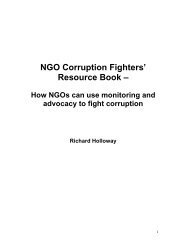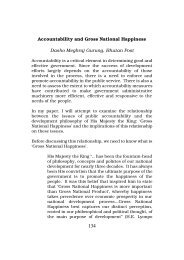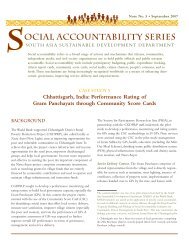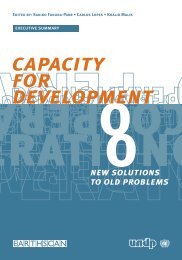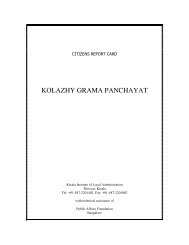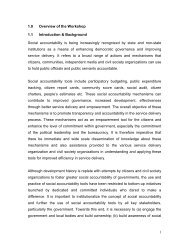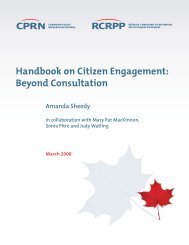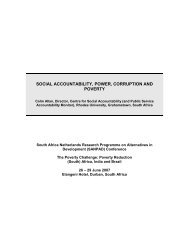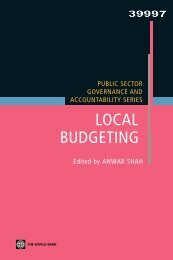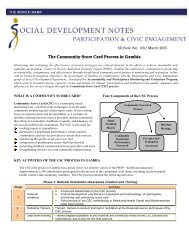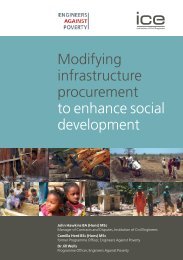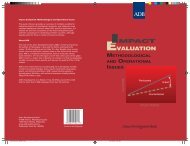Enabling Environment for Social Accountability in ... - SASANet
Enabling Environment for Social Accountability in ... - SASANet
Enabling Environment for Social Accountability in ... - SASANet
You also want an ePaper? Increase the reach of your titles
YUMPU automatically turns print PDFs into web optimized ePapers that Google loves.
wide mandate to manage and monitor the operations of schools. In 2000, MoECS adopted Regulation 92<br />
to clarify the role of school boards, specify<strong>in</strong>g their authority to: 1) hire and dismiss school pr<strong>in</strong>cipals; 2)<br />
approve and amend school budgets and <strong>in</strong>vestment schedules; 3) approve salary funds and number of<br />
employees; 4) approve the development of policy, mission, curriculum, and bus<strong>in</strong>ess plans; and 5)<br />
develop their own <strong>in</strong>ternal procedures.<br />
Initially, the boards were to be composed of 17 members, with only teachers, students, parents, and<br />
representatives of local organizations to serve on a board. In 1998, however, an amendment extended<br />
representation to <strong>in</strong>clude alumni and representatives of the aimag governors as “the founders” of public<br />
schools. 81 Under this new amendment, the representatives of the founders were not elected to the board<br />
like other members, but were usually the soum governors or their designees. Moreover, the amendment<br />
stipulated that the founders were to hold a majority of 51-60 percent of the seats on the board.<br />
In May 2002, a new law on education was adopted <strong>in</strong> which the role of the now highly politicized boards<br />
was essentially reduced to an advisory one (F<strong>in</strong>d<strong>in</strong>g EDU 1). These changes were adopted <strong>in</strong> the broader<br />
context of recentralization, which stripped the boards of their fiscal responsibility. The boards lost their<br />
power to approve school budgets and were left only with the right to comment on proposals submitted by<br />
school pr<strong>in</strong>cipals to representatives of the M<strong>in</strong>istry of Education.<br />
In addition to their lost fiscal authority, school boards lost their power to hire or dismiss pr<strong>in</strong>cipals; they<br />
could merely propose candidates <strong>for</strong> the positions. The governor of Uyanga soum acknowledged that<br />
under the new system, boards could technically “block” a candidate nom<strong>in</strong>ated by a governor, but<br />
ultimately the governor could override their veto and hire or dismiss a pr<strong>in</strong>cipal over the board’s<br />
objections. Consistent with the new more limited advisory role of school boards, <strong>in</strong> 2002 Regulation 230<br />
changed their name from school boards to school councils.<br />
The 2002 Law on Education also changed the process <strong>for</strong> appo<strong>in</strong>t<strong>in</strong>g members to the councils. The<br />
changes were deemed necessary to depoliticize the boards and to enhance cont<strong>in</strong>uity. In addition to<br />
reduc<strong>in</strong>g the council’s number to between 9 and 11, the new law stipulates that all members are to be<br />
elected at a general meet<strong>in</strong>g (an annual meet<strong>in</strong>g of stakeholders), although representatives of the other<br />
organizations are nom<strong>in</strong>ated by the founders and merely approved at the general meet<strong>in</strong>g. These<br />
representatives reta<strong>in</strong> a majority on the councils even though there is no legal stipulation <strong>for</strong> this.<br />
THE REDUCED BUT CONTINUING ROLES OF<br />
SCHOOL COUNCILS IN SOCIAL ACCOUNTABILITY<br />
Public officials and community members both perceived the reduced authority of the school councils as<br />
underm<strong>in</strong><strong>in</strong>g their role. The two parent representatives on the Uyanga School Council, <strong>for</strong> example, noted<br />
that unlike the <strong>for</strong>mer school boards, the councils have no real authority to monitor the pr<strong>in</strong>cipal or the<br />
school budget. At the national level, a member of the Stand<strong>in</strong>g Committee on Education of the State<br />
Great Khural also noted that school councils have no real authority, as they can merely suggest how to<br />
support school activities, improve the quality of services, and ma<strong>in</strong>ta<strong>in</strong> parent <strong>in</strong>volvement. Various<br />
stakeholders <strong>in</strong> both Ulaanbaatar and Uyanga echoed these critical assessments of the new school<br />
councils.<br />
81 Under Mongolian Education Law, the aimag or city governors have the authority to create, trans<strong>for</strong>m, or disband a local<br />
school. As such they are characterized as the “founders” of public schools.<br />
85



